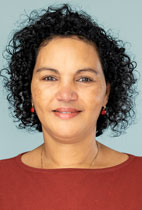Azeb Amha wins award with essay on language and interactions with non-human animals

Azeb Amha and a group of scholars from various universities have won the 2nd and 3rd prize of the Grotevragenprijs competition of the Landelijke Onderzoekschool Taalwetenschap (National Research School of Linguistics, LOT) with an essay on language and interactions with non-human animals. The competition is co-organised by LOT and the Algemene Vereniging Taalwetenschap (General Linguistics Association, AVT). Azeb is a senior researcher and lecturer at the African Studies Centre Leiden. Her interest is in grammar, linguistic typology and in the interdisciplinary fields of anthropological linguistics and sociolinguistics.
In the essay, entitled 'Reimagining Language: Towards a better understanding of language by including our interactions with non-humans', the authors reexamine the foundational question 'what is language?' next to the question 'who can be said to have it?'. They contend that these duo-questions will be central in linguistic inquiry in the coming decades due to the challenges of interactivity in today's ‘smart’ speakers and language models. The authors call for the boundaries of linguistic inquiry to be pushed by raising new questions, such as: what do animals and artificial agents communicate to us, and what does it mean to listen to them? How do we adjust our language towards beings with different perception-action systems, whether animals or robots? What do we do when a semblance of fluid language is not a reliable cue to the presence of a social agent? How can humans co-construct meaning with other animals? They emphasise the need for a radically inclusive approach to the language sciences that takes into account both human-animal interaction and human-computer interaction as this will yield profound insights into language and communication. Using this approach, the authors propose to study how and why humans and non-human animals adapt and create signals for interspecies interactions, and when and how they mobilise these resources. The radically inclusive approach the authors call attention to is timely in light of societal challenges that relate to how people interact with machines and animals, and it will help develop a less human-centered theory of language.
The prize includes publication of the essay in the journal Linguistics in the Netherlands and financial and logistics support to develop the essay into a research project. The 2nd and 3rd prizes are shared ex aequo with a team from Tilburg University.
Posted on 19 June 2023, last modified on 23 September 2024

